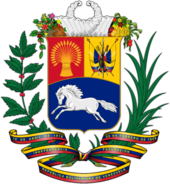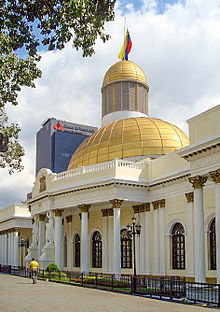National Assembly of Venezuela
|
National Assembly Asamblea Nacional |
|
|---|---|
| 4th National Assembly | |
 |
|
| Type | |
| Type | |
| Leadership | |
|
1st Vice President
|
|
|
2nd Vice President
|
|
|
Majority Leader
|
|
|
Minority Leader
|
|
| Structure | |
| Seats | 167 |
 |
|
|
Political groups
|
Opposition (112)
Government (55) |
| Elections | |
| Parallel voting | |
|
Last election
|
6 December 2015 |
| Meeting place | |
 |
|
| Federal Legislative Palace, Caracas | |
| Website | |
| Asamblea Nacional | |
Opposition (112)
Government (55)
The National Assembly (Spanish: Asamblea Nacional) is the legislative branch of the Venezuelan government. It is a unicameral body made up of a variable number of members, who are elected by "universal, direct, personal, and secret" vote partly by direct election in state-based voting districts, and partly on a state-based party-list proportional representation system. The number of seats is not constant, each state and the Capital district elect three representatives plus the result of dividing the state population by 1.1% of the total population of the country. Three seats are reserved for representatives of Venezuela's indigenous peoples and elected separately by all citizens, not just those with indigenous backgrounds. For the 2010-2015 period the number of seats is 165. All deputies serve five-year terms. The National Assembly meets in the Federal Legislative Palace in Venezuela's capital, Caracas.
Under its previous 1961 Constitution, Venezuela had a bicameral legislature, known as the Congress (Congreso). This Congress was composed of a Senate (Senado) and a Chamber of Deputies (Cámara de Diputados).
The Senate was made up of two senators per state, two for the Federal District, and a number of ex officio senators intended to represent the nation's minorities. In addition, former presidents (those elected democratically or their replacements legally appointed to serve at least half a presidential term) were awarded lifetime senate seats. Senators were required to be Venezuelan-born citizens and over the age of 30.
...
Wikipedia
